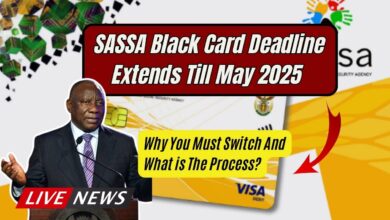Universal Credit Claimants Notified of New Bonus Payment by Martin Lewis: Are You On The List Of Beneficiaries?
Universal Credit Claimants Notified of New Bonus Payment by Martin Lewis – If you’re on Universal Credit and looking for a serious money win, Martin Lewis, the UK’s go-to money guru, has a message you can’t afford to miss. There’s a government-backed savings scheme that can hand you up to £1,200 in free bonus cash, and you don’t even need to be a big saver to qualify. Yep—this is real, and it’s all part of the Help to Save program.

Martin Lewis, the founder of MoneySavingExpert.com, calls it a “totally unbeatable” savings hack. Let’s break down what it is, who gets it, how it works, and whether you’re in line for this sweet cash boost.
Universal Credit Claimants Notified of New Bonus Payment by Martin Lewis
| Point | Details |
|---|---|
| Program Name | Help to Save |
| Announced By | Martin Lewis (MoneySavingExpert) |
| Eligibility | Universal Credit claimants with at least £1 income in last assessment period |
| Bonus Amount | Up to £1,200 over 4 years |
| Savings Allowed | £1 to £50 per month |
| Bonus Rate | 50% of your highest savings balance |
| Sign-Up Link | gov.uk/help-to-save |
| Official Source | MoneySavingExpert.com |
The Help to Save scheme is a golden opportunity—free government money just for saving a few pounds each month. Martin Lewis is practically begging folks to jump on this, and for good reason: £1,200 in bonus cash is nothing to sneeze at.
If you’re on Universal Credit, this could be your path to a financial cushion—no gimmicks, no catch, just smart saving. With the 2025 eligibility expansion, millions more now qualify. So don’t sit on this—go open your account today and start stacking those pounds.
What’s the Buzz About Help to Save?
Help to Save is a UK government scheme set up for folks on low incomes—especially those receiving Universal Credit or Working Tax Credit. It’s designed to help you build a rainy-day fund, even if saving feels out of reach right now.
And here’s the kicker: for every £1 you save, the government adds 50p. That’s a guaranteed 50% return on your money. In today’s economy, that’s especially valuable, especially when most savings accounts barely touch 5%.
Let’s say you save £50 each month. Over two years, that’s £1,200 saved—and you’ll get a £600 bonus on top. Keep saving for another two years, and you can score another £600. That adds up to a £1,200 tax-free bonus.
Who’s Eligible for the Help to Save Bonus?
Not everyone qualifies, but millions now do after recent changes in 2025. To qualify:
- You must be getting Universal Credit, and
- You must have earned at least £1 in your last monthly assessment period
OR - You’re receiving Working Tax Credit
If you meet those requirements, you can open an account today at gov.uk/help-to-save.
Important update for 2025: The earnings threshold was lowered from £604.56 to just £1, meaning millions more people are now eligible thanks to this expansion.
How Does the Bonus Actually Work?
Here’s how you make the most of this scheme:
Step 1: Open Your Help to Save Account
- Visit gov.uk/help-to-save
- Log in with your Government Gateway ID
- It takes about 5 minutes to set up
Step 2: Start Saving
- You can save between £1 and £50 a month
- Missed a month? No worries—this program is flexible, and you won’t be penalized
- You can stop and start saving whenever you like
Step 3: Get Your Bonus
- After 2 years: You’ll get 50% of your highest balance—max £600
- After 4 years: Get another 50% of the difference between your highest balance in years 3–4 and your highest balance in years 1–2
That’s a maximum of £1,200 in bonuses, plus your savings.
Real-Life Example: Claire’s £3,600 Turnaround
Claire, a single mom from Manchester, saved £50 each month after hearing Martin Lewis talk about Help to Save on TV. After four years, she had:
- £2,400 of her own savings
- £1,200 in bonus payments
That’s £3,600 total, with no taxes, no fees, and complete flexibility. “It saved me during Christmas and back-to-school season,” she told The Sun.
Does Saving Affect Your Benefits?
The answer is mostly no.
- Your Help to Save balance won’t count against your Universal Credit or Tax Credit calculations
- If you have more than £6,000 in total savings across all accounts, it could reduce your benefits slightly
- The Help to Save bonus itself doesn’t count as savings
So, unless you’ve already got significant savings elsewhere, this bonus won’t hurt your benefits.
Should You Use It If You’re in Debt?
- If you’re dealing with high-interest debt (like credit cards or payday loans), tackle that first
- If your debt is under control, this savings program can be your safety net
Martin Lewis’s Tip: “Use Help to Save if your debts are manageable and you’re not paying more than 50% APR interest anywhere.”
How to Apply: Step-by-Step Guide for Universal Credit Claimants Notified of New Bonus Payment by Martin Lewis?
- Go to gov.uk/help-to-save
- Click ‘Apply now’
- Log in with your Government Gateway ID (or create one)
- Enter basic details like income, NI number, and Universal Credit status
- Start saving monthly by setting up a standing order or manual transfer
Martin Lewis’s Take
“This is the best savings deal for anyone on low income. The rate is unbeatable, the rules are simple, and the reward is real. If you qualify, don’t sleep on it.”
Common Pitfalls to Avoid
- Not opening the account in time: This scheme is open for a limited time. Don’t delay.
- Thinking small amounts don’t matter: Even £1 per month counts toward your bonus.
- Closing the account too soon: To get the full £1,200, stick it out for the full 4 years.
- Forgetting to check your balance: Keep tabs online to make sure your transfers are going through.
More Help and Resources
- Help to Save: GOV.UK Official Page – gov.uk/get-help-savings-low-income
- MoneySavingExpert’s Help to Save Guide – moneysavingexpert.com/savings/help-to-save
- Citizens Advice: Universal Credit Savings – citizensadvice.org.uk
- Turn2us.org.uk – Benefit & Savings Guidance – turn2us.org.uk
£100 DWP Cost of Living Payment Incoming – Is Your Household on the List?
DWP Confirms Bank Surveillance Rollout to Tackle Fraud—Will Your Finances Be Flagged?
“DWP Just Announced a £300 Payment – Everything You Must Know for 2025!”
FAQs About Universal Credit Claimants Notified of New Bonus Payment by Martin Lewis
Q1: Can I withdraw my savings anytime?
Yes. You can take your money out whenever you want, no fees or penalties.
Q2: What happens if I stop saving for a few months?
No problem. You’ll get the bonus based on your highest savings balance, not how consistently you saved.
Q3: Is the bonus taxed?
No. The government bonus is 100% tax-free.
Q4: Can both me and my partner apply if we’re both on Universal Credit?
Yes. Both partners can open separate Help to Save accounts if eligible.
Q5: What if I start working full-time or stop receiving Universal Credit?
Once you’ve opened your account, you can keep saving for up to 4 years—even if your benefit status changes.
Q6: Can I set up direct debit or auto-pay?
Yes. You can automate payments using your bank’s standing order feature.
Q7: What banks can I use to save into the account?
Any UK bank or building society account can be linked as long as it’s in your name.







